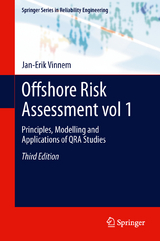Offshore Risk Assessment vol 1.
Springer London Ltd (Verlag)
978-1-4471-5206-4 (ISBN)
This updated and expanded third edition has been informed by a major R&D program on offshore risk assessment in Norway and summarizes research from 2006 to the present day. Rooted with a thorough discussion of risk metrics and risk analysis methodology, subsequent chapters are devoted to analytical approaches to escalation, escape, evacuation and rescue analysis of safety and emergency systems.
Separate chapters analyze the main hazards of offshore structures: fire, explosion, collision, and falling objects as well as structural and marine hazards. Risk mitigation and control are discussed, as well as an illustration of how the results from quantitative risk assessment studies should be presented. The third second edition has a stronger focus on the use of risk assessment techniques in the operation of offshore installations. Also decommissioning of installations is covered.
Not only does Offshore Risk Assessment describe the state of the art of QRA, it also identifies weaknesses and areas that need further development. This new edition also illustrates applications or quantitative risk analysis methodology to offshore petroleum applications.
Acomprehensive reference for academics and students of marine/offshore risk assessment and management, the book should also be owned by professionals in the industry, contractors, suppliers, consultants and regulatory authorities.
Jan Erik Vinnem is Professor II of Risk Analysis at University of Stavanger, Norway. He is also a specialist advisor and CEO of Preventor AS, a consultancy to the Norwegian offshore industry. His professional career includes experience in the petroleum industry (Statoil and Total), and work as a private consultant (as the founder of Safetec Nordic AS and Preventor AS), in addition to his time in research and education. His research interests include decision support tools, risk management, risk acceptance, risk analysis methods, and risk assessments reflecting human and organizational factors
Part I.- 1.Introduction.- 2.Risk Picture: Definitions and Characteristics.- 3.Risk Assessment process and Main Elements.- 4.Lessons from Major Accidents.- 5.Lessons from Macondo Accident.- Part II.- 6.The Occurrence of Hydrocarbon Leaks: Process Systems.- 7.Fire Risk Modelling.- 8.Explosion Risk Modelling.- 9.Collision Risk Modelling.- 10.Marine Systems Risk Modelling.- 11.Risk due to Miscellaneous Hazards.- 12.Fatality Risk Assessment.- 13.Helicopter Transportation Fatality Risk Assessment.
| Reihe/Serie | Offshore Risk Assessment | 1.10 | Springer Series in Realibility Engineering |
|---|---|
| Zusatzinfo | 22 Illustrations, color; 137 Illustrations, black and white; XLII, 570 p. 159 illus., 22 illus. in color. |
| Verlagsort | England |
| Sprache | englisch |
| Maße | 155 x 235 mm |
| Themenwelt | Mathematik / Informatik ► Mathematik ► Angewandte Mathematik |
| Naturwissenschaften ► Biologie ► Ökologie / Naturschutz | |
| Naturwissenschaften ► Physik / Astronomie | |
| Technik ► Bauwesen | |
| Technik ► Maschinenbau | |
| Schlagworte | Barriers • Hydrocarbon leak risk • Offshore Risk Assessment • QRA Studies • Quantitative risk analysis |
| ISBN-10 | 1-4471-5206-9 / 1447152069 |
| ISBN-13 | 978-1-4471-5206-4 / 9781447152064 |
| Zustand | Neuware |
| Informationen gemäß Produktsicherheitsverordnung (GPSR) | |
| Haben Sie eine Frage zum Produkt? |
aus dem Bereich





